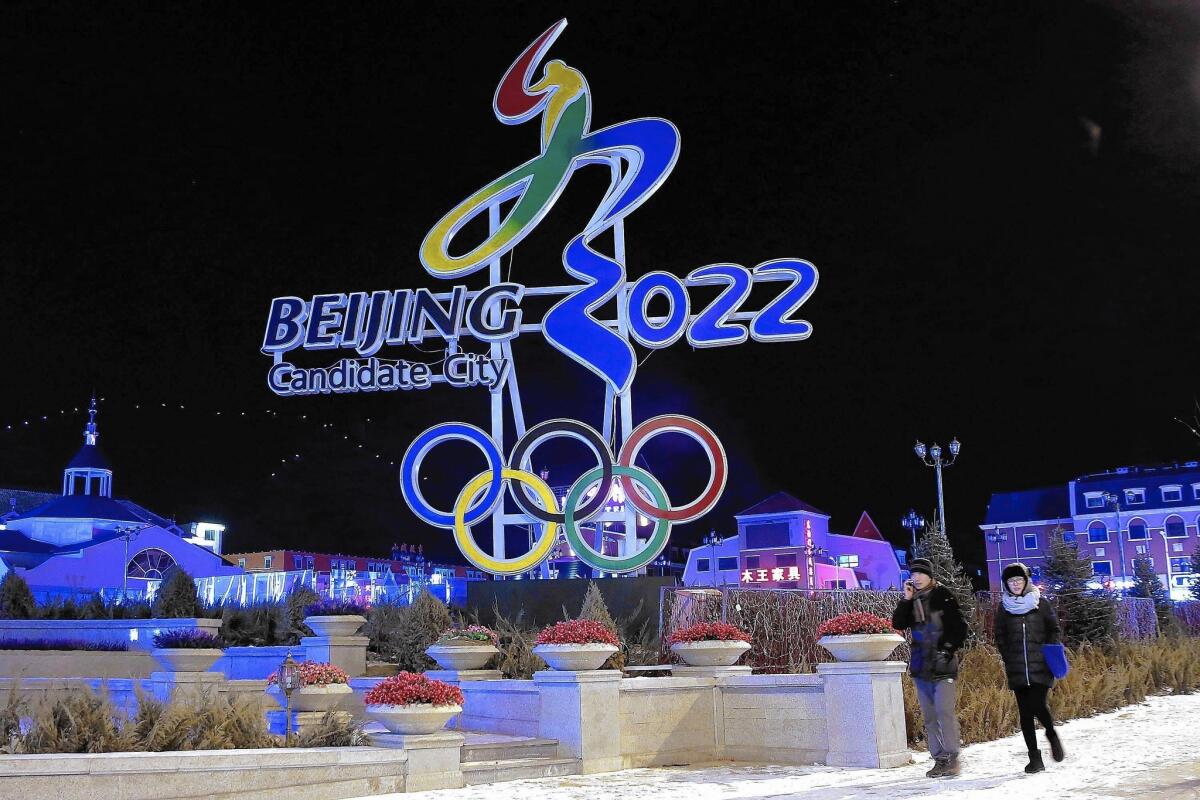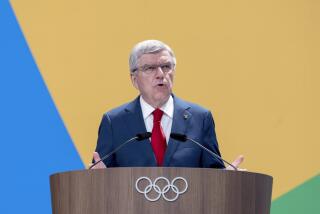China running against light competition for the 2022 Winter Olympics

- Share via
Reporting from Zhangjiakou, China — At first glance, Beijing’s quest to host the 2022 Winter Olympics may sound, well, a bit quixotic. After all, the city’s skies are notoriously smoggy, its main proposed ski venue is a five-hour drive northwest of the city center, and the mountains there receive, bid organizers acknowledge, about 8 inches of snow annually.
But over the last year, Beijing’s competition — once seen as formidable — has melted away. Cost concerns and faltering public support prompted pullbacks by Oslo; Stockholm; Munich, Germany; and Krakow, Poland. The Ukrainian city of Lviv also had to bow out amid the military, political and economic crises in that country.
That has left the Chinese capital squaring off against just one opponent — Almaty, Kazakhstan — in what to many observers is feeling increasingly like a Goliath-vs.-David contest between two autocratic nations. Kazakhstan, a sprawling former Soviet satellite that sits on China’s far western border, is oil-rich, but its population of 17 million is smaller than that of Beijing, a metropolis of 21 million. Almaty, Kazakhstan’s largest city, has 1.5 million people.
In mid-February, the International Olympic Committee’s Evaluation Commission will conduct an inspection in Almaty, followed by one in Beijing in late March. A final decision is due to be rendered at the end of July at an IOC gathering in Kuala Lumpur, Malaysia.
“Very few people in the IOC, and in the wider sports community, see the choice between Almaty and Beijing as particularly desirable on any count,” said John J. MacAloon, a University of Chicago anthropologist and historian who has studied the Olympics extensively.
The IOC last month adopted a package of reforms aimed at reducing costs for host cities and making the process more flexible while requiring greater protections for human rights, labor and the environment. That’s attracted a wealth of interest in bidding for the 2024 Summer Games, but “unfortunately the reforms were not passed quickly enough to produce a wider field for 2022,” MacAloon said. “So the IOC is stuck.”
The 2022 Games present the IOC with a complex set of issues, from geographic diversity to human rights concerns.
If Beijing is chosen, that would mean three straight Olympics in East Asia, because Pyeongchang, South Korea, is hosting the 2018 Winter Games, and Tokyo is hosting the 2020 Summer Games.
“That would normally seem totally inconceivable, not to mention Beijing just hosted the Summer Games in 2008 and it’s not a ‘typical’ winter sports city,” said Robert Livingstone, who follows the host-city competition for the website gamesbids.com.
Although seven cities have hosted the Olympics at least twice, no city has hosted both the Summer and Winter Games, and no city has hosted twice within such a short period, he said.
Kazakhstan would offer the IOC the opportunity to take the Olympics to Central Asia for the first time. Almaty hosted the 2011 Asian Winter Games and is preparing to welcome the 2017 Winter World University Games, or Universiade. Yet its experience with big international sporting events is limited compared with Beijing’s.
“The odds were so heavily stacked against [China], but now here we are and it’s Beijing and Almaty,” Livingstone said. “A lot of people are saying Beijing is the favorite, with Beijing being a more recognizable city and having that more recent [Olympic] experience.”
An initial evaluation performed by the IOC in mid-2014 rated Oslo, Beijing and Almaty on 14 aspects, including safety, government and public support. Between Beijing and Almaty, Beijing came out ahead on all but two factors: transportation and “games concept and competition venues.”
In Almaty, all venues would be within about 20 miles; its bid committee is touting the city as offering one of the “most compact” Games in the last 40 years.
Beijing, for its part, has proposed holding bobsled, skeleton, luge and alpine skiing events in Yanqing, about a 60-mile drive from central Beijing, and snowboarding, cross-country skiing, freestyle skiing, biathlon and other events at a ski area that’s a 150-mile drive from Beijing, north of the city of Zhangjiakou.
Chinese organizers have promised to build a high-speed rail link to those cities, cutting travel time to Zhangjiakou to 50 minutes, and separate Olympic villages would be built in those areas for athletes competing there. But that has fueled concern that the Games would not have a unified feel.
Almaty is selling itself as a “true mountain town” with snow leopards roaming in the 13,000-foot peaks that are “literally flowing into the city.” Beijing, meanwhile, is trumpeting itself as the “safe, secure, reliable and risk-free choice.”
Wang Hui, chief spokeswoman for the Beijing bid committee, said the capital’s meager annual snowfall levels should not be a concern because “all host countries must produce [artificial] snow” to ensure proper conditions for competition. Though Beijing and much of northern China are chronically parched, so much so that the country recently built a $32-billion channel to move water 800 miles from the south to Beijing, authorities insist that there is enough water to make snow.
Chinese authorities also see the 2022 Olympics as a way to “ignite the passion of the 1.3 billion Chinese people for Olympic winter sports,” as President Xi Jinping said in a letter to the IOC chief. The Winter Games, Chinese authorities also say, would help develop a market among China’s consumers for skiing, snowboarding and other cold-weather sports, which dovetails with a national aim of increasing domestic consumption and shifting the economy away from heavy reliance on exports and investment.
Peh Shing Huei, author of “When The Party Ends: China’s Leaps and Stumbles After the Beijing Olympics,” said he regarded Beijing’s bid as a “slam dunk.”
“Given the increasingly commercial bent of the Olympics, it certainly makes more sense for the IOC to hold the Winter Games in China rather than Kazakhstan,” Peh said. “It will also be a boost for the Winter Games’ popularity, allowing it to play some catch-up with its much more famous Summer Games cousin.”
One thing the Games are unlikely to do, said Peh, is improve the human rights situation, as many had hoped the 2008 Summer Games would do.
“The story of China after the 2008 Games has been one of tightening controls” on dissidents and freedom of expression, he said. “And looking at Xi in the last two years, he is not veering off this track.”
Not that Kazakhstan, which has been run by President Nursultan Nazarbayev since independence in 1991, is much better an alternative in this regard. Human Rights Watch, in its 2014 global report, said the country’s “poor human rights record continued to deteriorate in 2013, with authorities cracking down on free speech and dissent through misuse of overly broad laws” and maintaining “strict controls on freedom of assembly and religion.”
Although Kazakhstan has in recent years ratified various international protocols on human rights, watchdog groups say compliance has been spotty. In December, the Office of the U.N. High Commissioner for Human Rights’ Committee Against Torture said in a report that it was “particularly concerned about persistent allegations of torture and ill treatment committed by law enforcement officials, including the threat of sexual abuse and rape,” in Kazakh detention facilities for the purpose of extracting “voluntary confessions” or information to be used as evidence in criminal proceedings.
“The Olympic spirit has come to this: Two authoritarian countries are vying to host the 2022 Winter Games, competing to endure a huge financial strain for the benefit of burnishing their public image,” Minky Worden, Human Rights Watch’s director of global initiatives and editor of “China’s Great Leap: The Beijing Games and Olympian Human Rights,” wrote in an opinion piece this month.
MacAloon, the University of Chicago historian, said China’s well-known human rights issues, along with the environment, remain two big negatives for Beijing. Before the 2008 Games, protesters complaining of Chinese repression in Tibet, among other issues, disrupted the torch relay and other events.
“Things haven’t gotten any more comfortable between the Tibetans and the Uighurs and the Beijing government since they were the center of massive disruptions and protests in 2008,” MacAloon said, and many in the Olympic movement believe that if not for the deadly Sichuan earthquake three months before the Games began, there would have been boycotts.
Peh said China is courting another Olympics to showcase the nation’s rise and increasingstrength, noting that the 2022 Games would “coincide nicely with the 10-year mark of Xi Jinping’s leadership, a good farewell party since he is slated to step down that year.”
But unlike 14 years ago, when a rising China was desperate to land the 2008 Summer Games as a global coming-out party, the country is now in a much more confident position.
“China doesn’t need the Olympics as much as it did in 2001, when it won the bid for the 2008 Games,” Peh said. “I would even go as far to say that it is the Olympics which needs China more today.”
More to Read
Sign up for Essential California
The most important California stories and recommendations in your inbox every morning.
You may occasionally receive promotional content from the Los Angeles Times.














